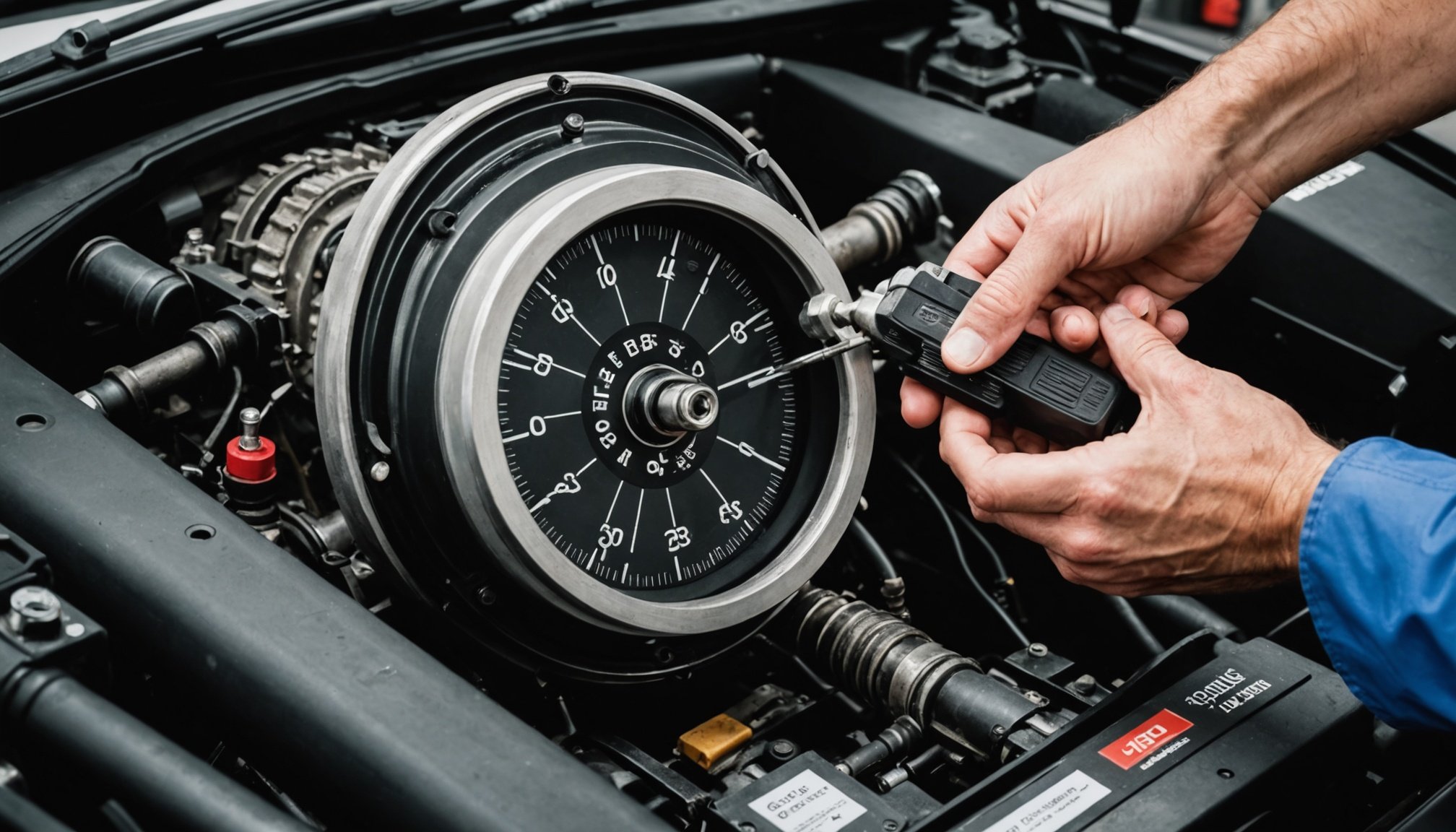Unlocking Torque Testing Techniques: The Ultimate Handbook for Engine Performance Evaluation in UK Vehicles
When it comes to evaluating the performance of vehicles, particularly in the UK, understanding and measuring torque is crucial. Torque, the twisting force that drives your car forward, is a key indicator of an engine’s health and efficiency. In this comprehensive guide, we will delve into the world of torque testing, exploring how it works, its importance, and the various techniques and tools used to optimize engine performance.
What is Torque and Why is it Important?
Torque is the rotational equivalent of linear force, and it plays a vital role in the operation of any vehicle. It is what propels your car forward, making it essential for both the performance and the safety of the vehicle.
Also to read : Achieve perfect car alignment at home: a comprehensive diy guide for uk drivers with common tools
How Torque Sensors Work
Torque sensors are devices that measure and record the twisting force applied to an object. Most torque sensors use strain gauges, which are thin resistive strips bonded to a rotating shaft. When torque is applied, these strain gauges detect minute deformations in the shaft, translating these into electrical signals that are then processed to give precise torque readings[1].
Real-World Applications of Torque Sensors
Torque sensors are vital in various sectors, including automotive engineering, industrial machinery, automation, and renewable energy. In automotive engineering, for instance, measuring torque in engines, transmissions, and electric drivetrains ensures performance and durability. In industrial settings, torque sensors help monitor and adjust equipment to maintain efficiency and prevent costly downtime[1].
Also to discover : The ultimate handbook for identifying and fixing typical electrical issues in 1990s british cars
ECU Tuning: A Key to Unlocking High Performance
ECU (Engine Control Unit) tuning, also known as remapping, is a powerful method to enhance your vehicle’s performance. Here’s how it works and why it’s so effective.
What is ECU Tuning?
ECU tuning involves modifying the software within your vehicle’s ECU to optimize its performance. Manufacturers often program ECUs conservatively to comply with global regulations and varying climates. By adjusting these settings, you can tailor the engine’s performance to your driving style and environment[3].
How ECU Tuning Works
ECU tuning modifies various parameters in the engine management system, including fuel injection timing, air-fuel ratio, ignition timing, and turbo boost pressure. This process is done using specialized software and hardware that communicates with the car’s ECU. Here are some key adjustments made during ECU tuning:
- Fuel Injection Timing: Adjusting when fuel is injected into the engine to improve power and efficiency.
- Air-Fuel Ratio: Optimizing the balance between air and fuel for maximum combustion efficiency.
- Ignition Timing: Tweaking the spark plug timing to boost power output.
- Turbo Boost Pressure: Increasing boost levels for turbocharged engines.
- Rev Limiter and Speed Governor Removal: Unlocking higher RPMs and top speeds[3].
Popular Cars for ECU Tuning
Certain cars are more popular for tuning due to their responsive ECUs and robust aftermarket support. These include:
- Volkswagen Golf GTI
- Subaru WRX STI
- Ford Mustang EcoBoost
- Audi S3
- BMW M Series
These cars offer a great balance between performance and tunability, making them favorites among car enthusiasts[3].
Tools and Techniques for Torque Testing
To accurately measure and optimize torque, several tools and techniques are employed.
Torque Sensors and Their Applications
As mentioned earlier, torque sensors are critical in measuring the twisting force applied to an object. Here are some factors to consider when selecting a torque sensor:
- Accuracy: Match the sensor’s precision to your application requirements.
- Measurement Range: Ensure the sensor can handle the expected torque values.
- Environment: Consider temperature, vibration, and other operating conditions.
- Output Type: Choose between analog or digital outputs depending on your system integration needs[1].
Hydraulic Torque Wrenches and Tensioning
In addition to electronic torque sensors, hydraulic torque wrenches are used to apply a specific rotational force to bolts and fasteners. Here’s how they work:
- Torquing: This involves applying a precise amount of torque to achieve the desired tension. However, this method can be less precise due to factors like friction and surface coatings.
- Tensioning: This approach uses hydraulic tools to elongate the bolt and exert a direct axial force, providing greater accuracy in maintaining consistent tension across all bolts[4].
The Importance of Accurate Torque Measurement
Accurate torque measurement is crucial for several reasons, including ensuring product quality, optimizing machine performance, and advancing innovation.
Ensuring Product Quality
In industries like automotive and aerospace, assembling components with the correct torque is vital. Over-tightening a bolt can weaken it, while under-tightening might cause it to fail. Torque sensors ensure precision in these scenarios, reducing defects and maintaining safety standards[1].
Optimizing Machine Performance
In manufacturing, torque sensors help monitor and adjust equipment to maintain efficiency. By detecting irregularities in torque, they can identify wear, misalignment, or potential failures before they lead to expensive machine downtime[1].
Advancing Innovation
Torque sensors enable cutting-edge advancements, from assisting robotic arms in replicating human dexterity to refining electric vehicle (EV) motors for optimal performance. Their precision unlocks innovation across industries[1].
Practical Insights and Actionable Advice
Here are some practical tips for optimizing your vehicle’s performance through torque testing and ECU tuning:
Choosing the Right Tools
When it comes to ECU tuning, using the right tools is essential. Here are some key tools you might need:
- OBD-II Scanners: For accessing the ECU.
- Tuning Software: Programs like HP Tuners or Cobb Accessport.
- Dyno Testing: For measuring and fine-tuning performance improvements[3].
DIY vs. Professional Tuning
While DIY tuning tools are available, professional tuning ensures precision and safety. A professional tuner has the expertise and equipment to maximize performance without compromising reliability.
Regular Maintenance
Regular maintenance is crucial for maintaining high performance. Here are some tips:
- Check and Adjust Torque Settings: Regularly check and adjust torque settings to ensure they are within the recommended range.
- Monitor Fuel Efficiency: Keep an eye on fuel efficiency, as it can be a good indicator of engine health.
- Update Software: Ensure your ECU software is up-to-date, as updates often include performance enhancements.
Case Study: Enhancing Fleet Performance
Univar Solutions, a company that emphasizes monitoring driving standards and optimizing vehicle performance, provides a compelling case study. Here’s how they improved their fleet performance:
Driver and Vehicle Focus
Univar Solutions fitted all their vehicles with telematics and linked this to a driver bonus scheme to reward good performance. Drivers undergo an in-depth induction process and are buddied up with colleagues to assess and review their performance. This focus on driving standards and vehicle maintenance has significantly improved their fleet’s overall performance[5].
Table: Comparing Emissions and Performance of Different Vehicles
Here is a comparative table showing the emissions and performance of different vehicles, highlighting the importance of torque and ECU tuning in optimizing engine performance:
| Vehicle Type | Emissions (CO2e per mile) | Torque (Nm) | Power (HP) | Fuel Efficiency (mpg) |
|---|---|---|---|---|
| Petrol Car | 220 | 200 | 150 | 30 |
| Diesel Car | 180 | 250 | 180 | 40 |
| Electric Car | 0 (tailpipe) | 300 | 200 | N/A (electric) |
| Hybrid Car | 120 | 220 | 160 | 50 |
| ECU Tuned Petrol | 200 | 250 | 200 | 35 |
| ECU Tuned Diesel | 160 | 300 | 220 | 45 |
Torque testing and ECU tuning are essential for evaluating and optimizing the performance of vehicles. By understanding how torque sensors work, the importance of accurate torque measurement, and the benefits of ECU tuning, you can unlock the full potential of your engine. Whether you are a car enthusiast looking to enhance your driving experience or a fleet manager aiming to improve overall performance, these techniques offer valuable insights and practical solutions.
Final Tips
- Invest in High-Quality Tools: Using high-quality torque sensors and tuning software can make a significant difference in the accuracy and reliability of your measurements.
- Seek Professional Advice: For complex tuning tasks, seeking advice from a professional can ensure that your vehicle’s performance is optimized safely and efficiently.
- Regularly Update and Maintain: Regular updates and maintenance are key to maintaining high performance and fuel efficiency.
By following these guidelines and leveraging the latest technologies in torque testing and ECU tuning, you can achieve improved performance, better fuel economy, and an overall enhanced driving experience.











